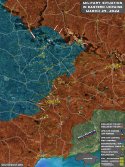Posted by Scott Ritter @RealScottRitter, the ex-USMC, on 29 March 2022
1/ Big Arrow War—a primer. For all those scratching their heads in confusion, or dusting off their dress uniforms for the Ukrainian victory parade in Kiev, over the news about Russia’s “strategic shift”, you might want to re-familiarize yourself with basic military concepts.
2/ Maneuver warfare is a good place to start. Understand Russia started its “special military operation” with a severe manpower deficit—200,000 attackers to some 600,000 defenders (or more). Classic attritional conflict was never an option. Russian victory required maneuver.
3/ Maneuver war is more psychological than physical and focuses more on the operational than on the tactical level. Maneuver is relational movement—how you deploy and move your forces in relation to your opponent. Russian maneuver in the first phase of its operation support this.
4/ The Russians needed to shape the battlefield to their advantage. In order to do this, they needed to control how Ukraine employed it’s numerically superior forces, while distributing their own smaller combat power to best accomplish this objective.
5/ Strategically, to facilitate the ability to maneuver between the southern, central, and northern fronts, Russia needed to secure a land bridge between Crimea and Russia. The seizure of the coastal city of Mariupol was critical to this effort. Russia has accomplished this task.
6/ While this complex operation unfolded, Russia needed to keep Ukraine from maneuvering its numerically superior forces in a manner that disrupted the Mariupol operation. This entailed the use of several strategic supporting operations—feints, fixing operations, and deep attack.
7/ The concept of a feint is simple—a military force either is seen as preparing to attack a given location, or actually conducts an attack, for the purpose of deceiving an opponent into committing resources in response to the perceived or actual actions.
8/ The use of the feint played a major role in Desert Storm, where Marine Amphibious forces threatened the Kuwaiti coast, forcing Iraq to defend against an attack that never came, and where the 1st Cavalry Division actually attacked Wadi Al Batin to pin down the Republican Guard.
9/ The Russians made extensive use of the feint in Ukraine, with Amphibious forces off Odessa freezing Ukrainian forces there, and a major feint attack toward Kiev compelling Ukraine to reinforce their forces there. Ukraine was never able to reinforce their forces in the east.
10/ Fixing operations were also critical. Ukraine had assembled some 60,000-100,000 troops in the east, opposite Donbas. Russia carried out a broad fixing attack designed to keep these forces fully engaged and unable to maneuver in respect to other Russian operations.
11/ During Desert Storm, two Marine Divisions were ordered to carry out similar fixing attacks against Iraqi forces deployed along the Kuwaiti-Saudi border, tying down significant numbers of men and material that could not be used to counter the main US attack out west.
12/ The Russian fixing attack pinned the main Ukrainian concentration of forces in the east, and drove them away from Mariupol, which was invested and reduced. Supporting operations out of Crimea against Kherson expanded the Russian land bridge. This phase is now complete.
13/ Russia also engaged in a campaign of strategic deep attack designed to disrupt and destroy Ukrainian logistics, command & control, and air power and long-range fire support. Ukraine is running out of fuel and ammo, cannot coordinate maneuver, and has no meaningful Air Force.
14/ Russia is redeploying some of its premier units from where they had been engaged in feint operations in northern Kiev to where they can support the next phase of the operation, namely the liberation of the Donbas and the destruction of the main Ukrainian force in the east.
15/ This is classic maneuver warfare. Russia will now hold Ukraine in the north and south while its main forces, reinforced by the northern units, Marines, and forces freed up by the capture of Mariupol, seek to envelope and destroy 60,000 Ukrainian forces in the east.
16/ This is Big Arrow War at its finest, something Americans used to know but forgot in the deserts and mountains of Afghanistan and Iraq. It also explains how 200,000 Russians have been able to defeat 600,000 Ukrainians. Thus ends the primer on maneuver warfare, Russian style.
[END]
Then a well-thought question to an actual ex-military man from someone there:
How has your position towards the future developments of the war changed during the time? Anything that surprised you and made you change your mind from the initial analysis?
The slow pace of operations. I never thought Russia would depart from its doctrine of overwhelming firepower and mass to preserve civilian life and property. The evidence clearly shows they have.

